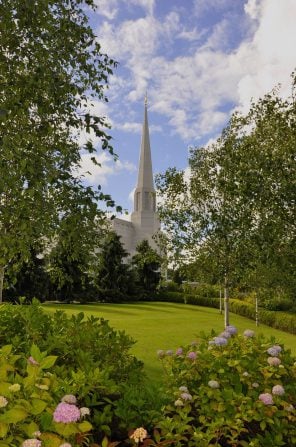
(LDS.org)
I published the column below in the Deseret News for 5 April 2018:
“The singing of hymns,” President Dallin H. Oaks, the first counselor in the LDS Church’s First Presidency, observed in “Worship through Music,” “is one of the best ways to learn the doctrine of the restored gospel.”
And, indeed, Latter-day Saint hymn lyrics, taken altogether, summarize essential church teachings remarkably well. Located at the very core of regular Mormon worship, they provide an instructive and reliable picture of what members of The Church of Jesus Christ of Latter-day Saints believe.
Some hymns (like the originally German “Hark, All Ye Nations!” celebrate the Restoration. Others contain concepts unique to the Restoration. For example, “Joseph Smith’s First Prayer” and “Praise to the Man” recall the story of the founding prophet and “An Angel from on High” and “The Iron Rod” summarize the recovery of the Book of Mormon. Some hymns focus on priesthood authority and duties (e.g., “Ye Elders of Israel” and “Come, All Ye Sons of God”).
Others emphasize the blessings of LDS temples, including sealings for eternity (examples include “Families Can Be Together Forever,” “Rise Ye Saints and Temples Enter,” and “How Beautiful Thy Temples, Lord”) and salvation for the dead (e.g, “High on the Mountain Top,” “Holy Temples on Mount Zion” and “Rejoice, Ye Saints of Latter Days”). Still others exult in continuing revelation (e.g., “We Thank Thee, O God, for a Prophet” and “Come, Listen to a Prophet’s Voice”).
Some hymns (such as “If You Could Hie to Kolob” and “O My Father”) highlight distinctive Mormon theology. “Our Savior’s Love” carefully devotes each of its three verses to a member of the Godhead, understood by Latter-day Saints to consist of three distinct personages.
Some hymns commemorate the unique LDS pioneer heritage. Both multigenerational members and recent converts sing “Come, Come, Ye Saints,” “For the Strength of the Hills,” “Carry On” and “O Ye Mountains High.” Reflecting the LDS Church’s often embattled history and its sometimes embattled present, some hymns (e.g., “Up, Awake, Ye Defenders of Zion,” “True to the Faith” and “As Zion’s Youth in Latter Days”) are resolute, even defiant.
This is as it should be. The LDS Church makes unique claims and teaches unique doctrines that distinguish it from mainstream Christianity. Mormonism freely and unapologetically acknowledges its uniqueness.
But Latter-day Saints remain Christians despite their distinctiveness, as the official hymnal both reflects and demonstrates.
For example, it contains numerous hymns associated with major mainstream Christian figures, including J. S. Bach (“O Savior, Thou Who Wearest a Crown”), Martin Luther (“A Mighty Fortress is Our God”), and the 18th-century English Christian poet William Cowper (“God Moves in a Mysterious Way”). “Praise God, from Whom All Blessings Flow” is a 17th-century Anglican “doxology.” Ten Latter-day Saint hymns come from the great English Protestant minister and hymn writer Isaac Watts (d. 1748), while six were composed by the famous Methodist leader Charles Wesley(d. 1788), younger brother to Methodism’s founder, John Wesley.
“Sing Praise to Him” comes from the 16th-century “Bohemian Brethren’s Songbook.” “Praise to the Lord, the Almighty” derives from the 17th-century “Stralsund Gesangbuch.”
But the LDS hymnal doesn’t draw solely from Protestant sources: St. Francis of Assisi (d. A.D. 1226) wrote the original-language words to “All Creatures of Our God and King,” while those of “All Glory, Laud, and Honor” were penned by Theodolph of Orleans (d. A.D. 821). The original Latin lyrics of “Jesus, the Very Thought of Thee” are ascribed to St. Bernard of Clairvaux (d. A.D. 1153). “Lead, Kindly Light” was written by the great John Henry Cardinal Newman (d. 1890).
Such hymns as “How Wondrous and Great,” “Glory to God on High,” “Because I Have Been Given Much,” “Glorious Things of Thee Are Spoken,” “How Great Thou Art,” “We Are All Enlisted,” “Cast Thy Burden upon the Lord” (with Mendelssohn’s wonderful melody), “Lord, Dismiss Us with Thy Blessing” (sung to a tune by the French-Swiss philosopher Jean-Jacques Rousseau), and Rudyard Kipling’s great “God of Our Fathers, Known of Old” originated well outside (and often before) the LDS Church.
Apart from the uniquely Mormon “Far, Far Away on Judea’s Plains,” Latter-day Saints celebrate Easter and Christmas squarely within the mainstream tradition of Christian hymns and carols. And, virtually every week, church members memorialize the Savior’s atoning sacrifice via prescribed prayers and in songs uniquely suited to that purpose.
In other words, the hymns used by Latter-day Saints in worship unmistakably identify them as a unique kind of Christians, just as they believe and claim. Denials that Mormons are Christians at all find no support in Mormon hymnology.
Posted from London, England











